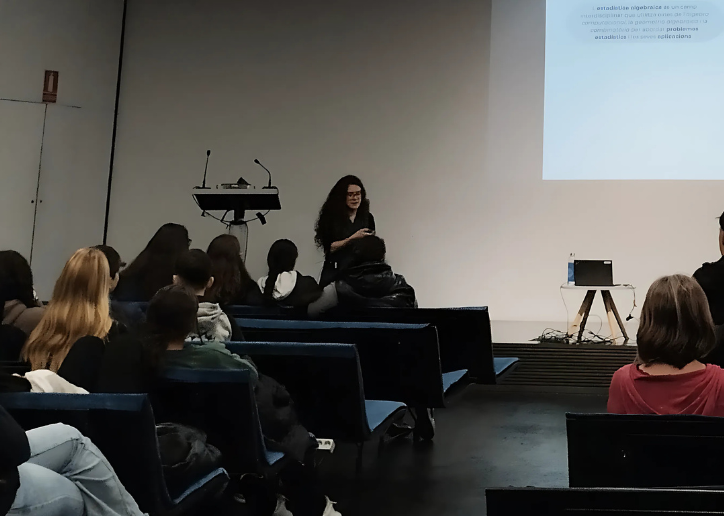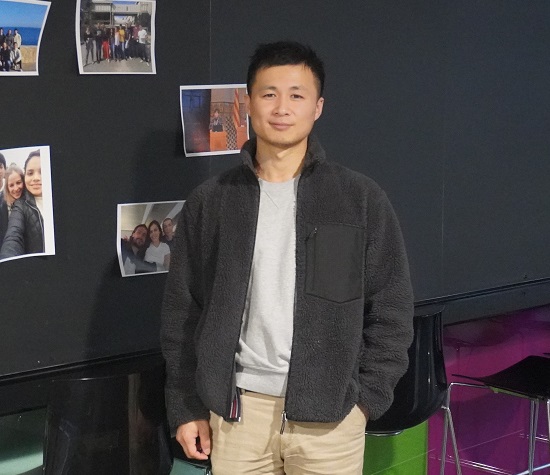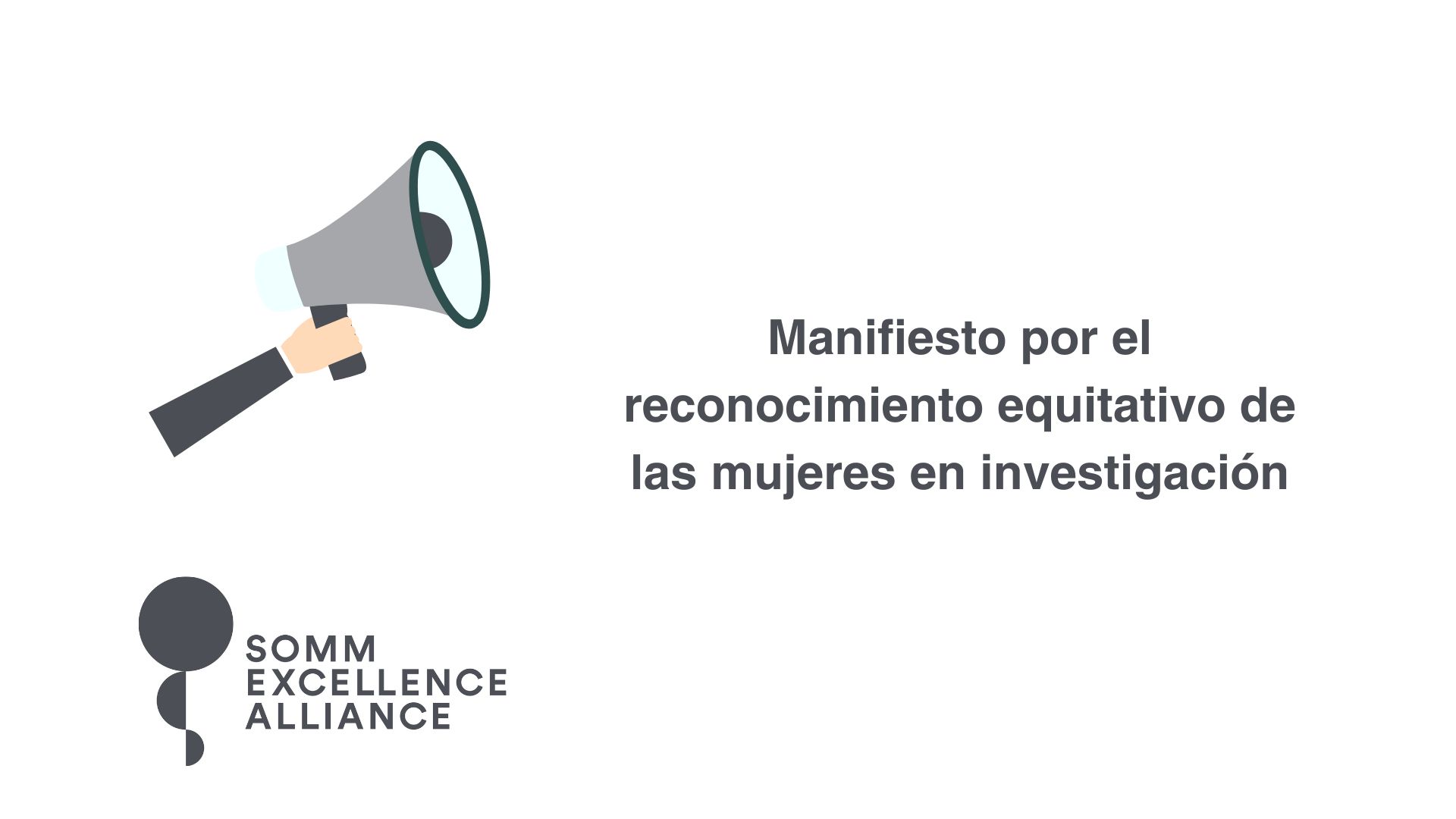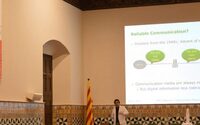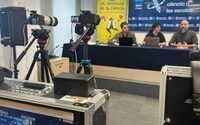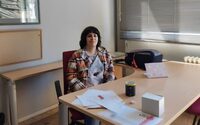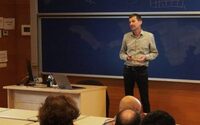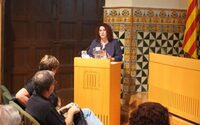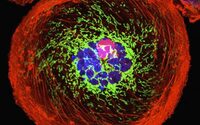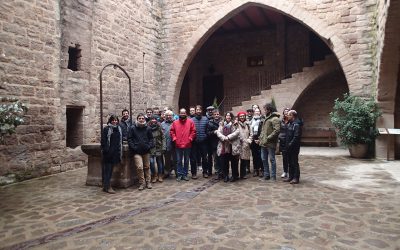On the 13th of February of 2023, the Kick-off meeting of the project Dynamical systems and computational mathematics towards the optimization of Therapeutic Interfering ParticleS as AntiVIRal therapy (TIPSAVIR) took place at the Centre de Recerca Matemàtica (CRM). The project is a Proof of Concept build upon the research performed in “The Mathematical Underpinnings of System Biology”, both funded by the Ministerio de Ciencia e Innovación (MICINN). The PIs from the project (and the previous one) are CRM’s researchers Josep Sardanyés and Tomás Alarcón, from the Mathematical and Computational Biology group.
Presenting the project
Lluis Alsedà (CRM’s director) opened the day expressing his delight for presenting a project of such an interdisciplinary nature – project in which he also participates as part of the research team. The project, that combines different research fields, from mathematics to virology, aligns to an interdisciplinary approach to research that the center is determined to encourage.
Josep Sardanyés, one of the project PIs, was in charge of presenting the project to the audience. As the motivation of the project, he explained the major burden viruses are for public health and economy (affecting, for example, agriculture). Despite that, the antiviral options available in the market are limited. One of the reasons is that viruses are extremely evolvable, thus, hard for the antiviral treatments and immune system to fight. The mutations can sometimes lead to Defective Viral Genomes (DVGs, incomplete copies of virus genomes) and if they keep the sequences that allow them to bind and replicate, they then can become Defecting Interfering Particles (DIPs). These particles are not harmful and replicative by themselves, but need to co-infect with the full virus, competing with it for cellular resources thus causing interference. DIPs have also been suggested to have the potential for transmission and immune system triggering.
Therapeutic Interfering Particles (TIPs), antiviral preparation engineered with the same philosophy as DIPs, have great potential to interfere with the replication of the standard virus, fighting for critical viral replication resources and reducing the virus replication rate.
The project is focused in designing TIPs using mathematical modeling and computer simulations. This approach will involve population dynamical models using Dynamical Systems Theory and tools from Artificial Intelligence (AI). The main goal is to be able to design highly interferent TIPs in a systematic and automated way, thus performing an enormous explorations of potential TIPs candidates with large interferent properties.
The scientific talks
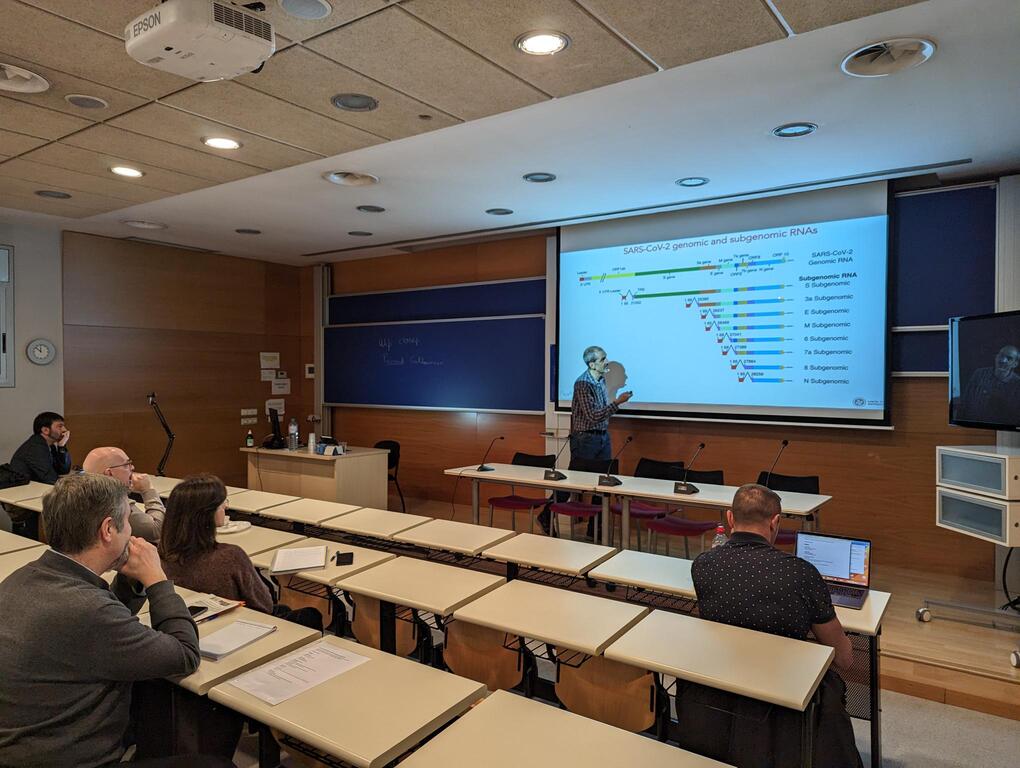 Santiago F. Elena in the middle of his scientific talk
Santiago F. Elena in the middle of his scientific talk
Santiago F. Elena, CSIC Professor at the Institute for Integrative Systems Biology (I2SysBio) and part of the research team of the project was in charge of giving the first scientific talk. Dr. Elena’s role will be to provide experimental data and ensure mathematical models are well ground in biological observations.
In the talk, entitled ‘Experimental evolution of betacoronavirus Defective Viral Genomes’, he gave an overview of the State-of-the-art of the research on DVGs. He explained the different defects present on virus genomes and their research on their identification and characterization of types and variabilities.
Lluis Alsedà, CRM director and researcher whose role in the project will be to supervise the design and implementation of the simulation models to investigate the evolutionary dynamics of DIPs, gave the second scientific talk.
He introduced AI tools for the simulation of DIPs production, discussing computational constraints and issues and showing first results based on initial simulations.
TIPSAVIR is the first scientific project obtained in collaboration with I2SysBio. These two centers built a CSIC associated unit (AU) in 2018. Since then, the AU has celebrated several activities including seminars, scientific meetings, and has published several articles in peer-review international journals (link).
The Translation Advisory Board
Last but not least, a discussion with the Translation Advisory Board (TAB) moderated by Dr. Arantxa Sanz (also part of the work team of the project) took place. In a project that combines two disciplines and has the aim of having a direct social impact, besides strong research, further expertise is needed, in terms of regulatory issues, scaling up the product and clinical expertise. Therefore, the TAB has been appointed to fulfill this gap from research to society, and most of its members were also present in the kick-off day.
The board counts with Isabel Amat (Reig Jofre), Jose Luis Cabero, Esther Riambau (Oniria Therapeutics CEO), Dr. Francisco Rodríguez Frias (Vall d’Hebron Institut de Recerca, VHIR), Dr. Josep Quer (VHIR), Dr. Maria-Carla Saleh (Pasteur Institute in Paris) and Marco Vignuzzi (A*STAR ID Labs).
 Josep Sardanyés, principal investigator of the project, presenting the team.
Josep Sardanyés, principal investigator of the project, presenting the team.
Besides Josep Sardanyés, Tomás Alarcón, Santiago F. Elena and Lluis Alsedà, the research team of the project will be rounded up with Pau Reig as a research technician. The work team, in addition to Arantxa Sanz, is constituted by Julia Hillung, María José Olmo-Uceda, David Romero and Carla Rubio.
To follow the advances of the project, keep track of the page (TBP).

CRM Comm Team
Anna Drou | Pau Varela
CRMComm@crm.cat
Subscribe for more CRM News
Roser Homs participa al projecte (In)visibles i (O)cultes
El 20 de desembre, el Museu de Ciències Naturals de Barcelona va acollir la cloenda del projecte (In)visibles i (O)cultes, amb la participació de Roser Homs, investigadora del CRM, que va oferir una xarrada als estudiants sobre la seva recerca i...
Entrevistamos a Pan Ye, nuevo doctor del Centre de Recerca Matemàtica
El pasado 11 de noviembre, Pan Ye, estudiante de doctorado del grupo de neurociencia del CRM, defendió su tesis titulada The Role of Behavioral Timescale Synaptic Plasticity for Memory Storage in Neural Networks, realizada bajo la dirección de Alex...
SOMMa impulsa un manifiesto por el reconocimiento equitativo de las mujeres en investigación
· "Por el reconocimiento equitativo de las mujeres en investigación" es el nombre del manifiesto lanzado por la Alianza de Centros de Excelencia Severo Ochoa y Unidades de Excelencia María de Maeztu (SOMMa), y suscrito asimismo por la Confederación...
Celebrating four decades of the Centre de Recerca Matemàtica (via EMS Magazine)
“Las matemáticas deben estar en el menú para que todos puedan descubrir su potencial”: entrevista a Adrián Paenza, divulgador matemático.
En esta entrevista, Adrián Paenza, matemático, periodista y divulgador argentino, reconocido por su labor en acercar las matemáticas al público hispanohablante de manera accesible y apasionada, nos comparte su trayectoria y reflexiones sobre la...
El CRM participa a la Setmana de la Ciència
Entrevistamos a Kristina Oganesyan, doctoranda del CRM
En esta entrevista, conversamos con Kristina Oganesyan, quien en marzo de 2024 defendió su tesis doctoral titulada "Three problems in harmonic analysis and approximation theory" bajo la dirección de Sergey Tikhonov. Kristina nos comparte su...
Nicolas Brunel’s Seminar on Cortical Network Dynamics at CRM
Nicolas Brunel, CRM Scientific Advisory Board member, delivered a seminar on the roles of inhibition in cortical network dynamics as part of the Barccsyn Seminar Cycle. He presented findings on how inhibition stabilizes neural activity and shapes...
Xavier Tolsa, Premi Nacional d’Investigació 2024
Xavier Tolsa, professor ICREA al Departament de Matemàtiques de la UAB i adscrit al CRM, ha rebut el Premi Nacional d'Investigació 2024 en la modalitat Julio Rey Pastor pel seu treball en àrees com l'anàlisi harmònic i la teoria geomètrica de...
Eva Miranda Awarded Prestigious Gauß Professorship
The Gauß Professorship, awarded by the Göttingen Academy of Sciences and Humanities, is a prestigious recognition given to scientists who excel in fields significant to Carl Friedrich Gauss, such as mathematics, physics, astronomy, and geophysics....


